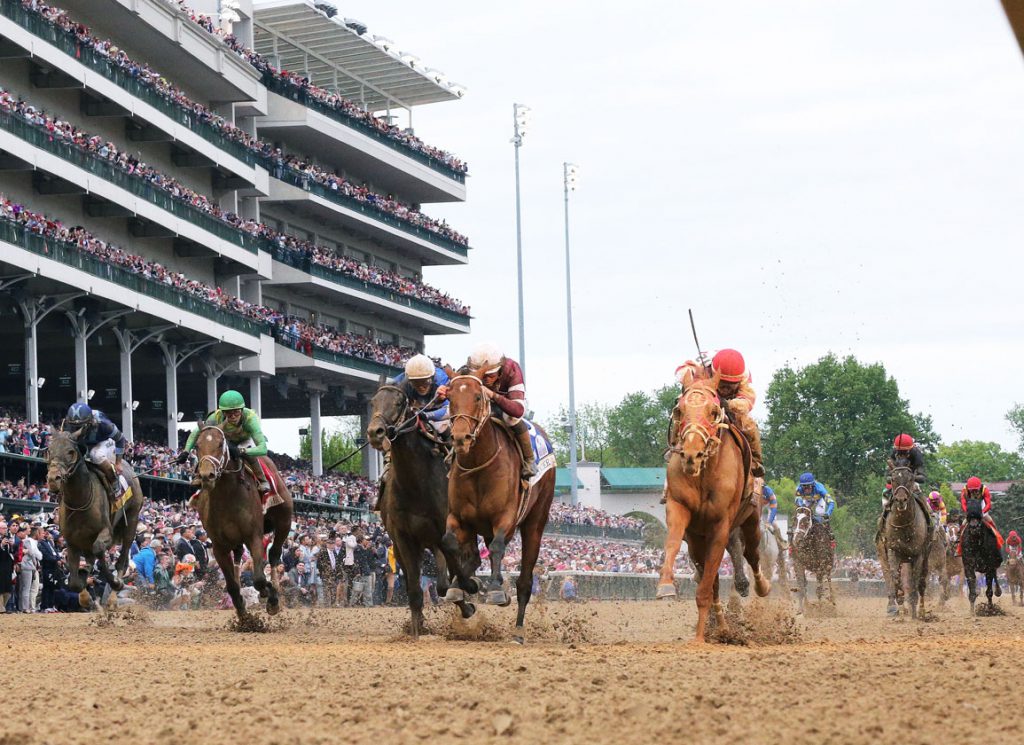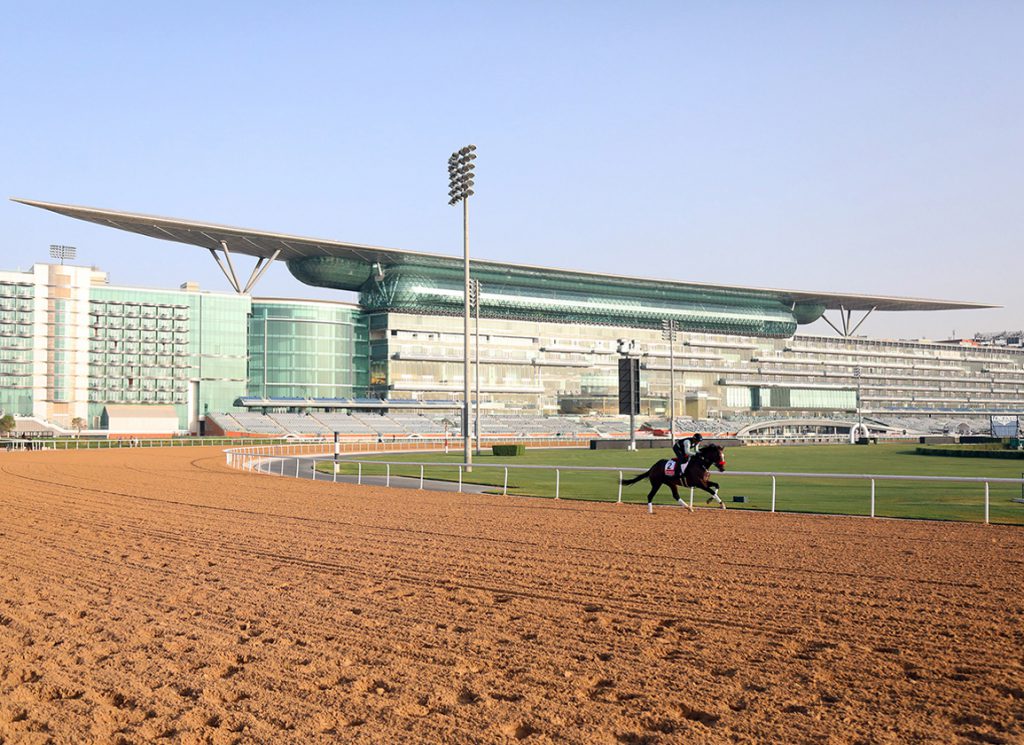They used to say that all roads lead to Rome. Now they all seem to lead to Louisville, whether you're starting from the desert or up the road in Florence, Kentucky. Some of us, even so, still miss the forgotten turnpike long favored by horsemen of the old school. In fact, there are times when I fear that we might actually have found ourselves on the road that is notoriously paved with good intentions.
Saturday opens the third cycle of rehearsals offering starting points for the GI Kentucky Derby. The first offered some marginal reward for precocity, with no more than 20 points (10 to the winner) for the vast majority of juvenile and what might be termed “short juvenile” (Jerome/Sham-style) qualifiers. Conspicuously, even these preclude sprint speed. The next phase, offering between 40 and 100 points, virtually guarantees the bigger scorers a start on the first Saturday in May; and now we enter this closing series of trials, three of which immediately give even placed horses every prospect of prying open a gate with their share of a whopping 200 points.
Not everyone will agree that all three merit quite that kind of help, and cynics will doubtless perceive some political considerations at play. The Jeff Ruby is only a Grade III race, run on synthetics, but it is staged at a track owned by Churchill Downs. And then there's the UAE Derby, a Group 2 staged halfway round the world.
(Click below to listen to this story as a podcast.)
It's not hard to see why a flying carpet should be provided direct from Meydan to Louisville, when the most lavish benefactor in the sport's history was for a long time so animated by the idea of winning the Kentucky Derby from his own homeland. For one reason or another, however, his stable lately seems to be leaving this particular path pretty clear.
Last year both the first two, respectively trained in Japan and locally, took their chips to the counter for a trip to Kentucky and actually had a decisive impact on the day, tearing off at such reckless speed that they set up something that has become extremely rare since the sprinters were banished from the Derby: a success from way off the pace.
Rich Strike (Keen Ice) himself, of course, had only made the bench because of 20 points banked when third in the Jeff Ruby, though what ultimately got him into the race was the solitary point he had previously earned for running fourth in the John Battaglia. That's another race on the synthetic at Turfway, by the way, and one this year upgraded to 40 points (from 17).
Yet I think it's only fair to acknowledge an inherent and evolving legitimacy to the kind of competition stimulated both by the UAE Derby, and the “back road” to Churchill along Interstate 71.
Rich Strike at least made it necessary to be open-minded about what sometimes happens when a horse transitions out of the synthetic trials-something to remember when it comes to the revelatory performance of Raise Cain (Violence) in the GIII Gotham S. That said, I still cling fiercely to the conviction that fewer horses than we tend to assume have that kind of emphatic specialism. Indeed, switching the race we now know as the Jeff Ruby to a synthetic surface very soon produced a couple of poster boys, in that respect, in Hard Spun and Animal Kingdom.
The Meydan race, meanwhile, has over the last decade been won by several elite talents. One was later beaten a nose in the GI Breeders' Cup Classic; another won two G1 Dubai World Cups; another ran second in the GI Travers that summer; while 2021 winner Rebel's Romance (Ire) (Dubawi {Ire}) returns to this card for the GI Longines Dubai Sheema Classic as a Breeders' Cup champion.
The international landscape continues to shift under our feet, so that even Dubai must now adapt to the intrusion of an even richer program in Riyadh-albeit hardly facing the kind of identity crisis its own emergence created for storied races like the GI Santa Anita Handicap. But one particular trend just continues to consolidate, with the Japanese in Riyadh having continued to hammer their flag into the top of the global pyramid.
They have got here, at least in part, by embracing aspects of the Thoroughbred that the American and European industries have disparaged as uncommercial. The Japanese have prized stamina and soundness, and they have resisted narrow, prescriptive thinking about what kind of blood works on what kind of surface.
Apart from anything else, that should discourage any resentment of the way the synthetic route to the Derby is being promoted at Turfway. Far more profoundly, however, the Japanese example should prompt Americans and Europeans alike to retrieve the faith their predecessors showed in the transferability of genetic prowess, when they sent likes of Nasrullah (Ire) and various sons of Northern Dancer on reverse journeys over the ocean.
As I've said before, the final straw came in 2021 when no European or American farm was prepared to match Japan's interest in Poetic Flare (Ire) (Dawn Approach {Ire}) after he contested Classics in three different countries in 22 days (won the first, and was beaten a short head on heavy ground in the third having run in France six days earlier) before taking his form to a new level in the G1 St. James's Palace S. the following month.
In stupefying contrast, the most accomplished horse in the GI Twinspires.com Louisiana Derby has been given two months to soak up his success in the GIII Lecomte S. So, while this race, historically, would seem a far more congenial environment for the distribution of 200 starting points than Meydan or Turfway, arguably the points system is facilitating a deplorable contrast to the way Jim Bolger promoted the genetic wares of Poetic Flare.
I can't presume to say whether it's the trainers themselves, or the breeders who provide their raw materials, that bear most responsibility for the idea that a Derby colt should be deliberately confined to one start in January and another in March. (To be clear, this is a general complaint-we're not singling out this particular horse's trainer here. The juvenile champion has been handled in very similar fashion.) At least the Fair Grounds trials have all been extended in distance, giving these horses a little more conditioning on the rare occasions we get to see them, with striking recent dividends. But having often lamented how the exclusion of sprinters has diluted the Kentucky Derby, as the ultimate showcase for the ability to carry speed, I now fear that it is watering down the breed in other respects, too.
If they're going to stick with the points system-and clearly they are-then maybe it's time to consider some kind of weighting in favor of those who make the road to the Derby a more diverse and interesting place; and the Derby itself a more instructive test. Bonus points or tiebreak advantage, perhaps, to the horse that shows merit over a spectrum of distances and/or surfaces, or even just for each start made.
Crazy ideas, no doubt, in a world where people are more interested in making a fast buck than breeding a fast horse. So crazy, in fact, that they might even be quite sensible.
The post This Side Up: Missing The Point appeared first on TDN | Thoroughbred Daily News | Horse Racing News, Results and Video | Thoroughbred Breeding and Auctions.


